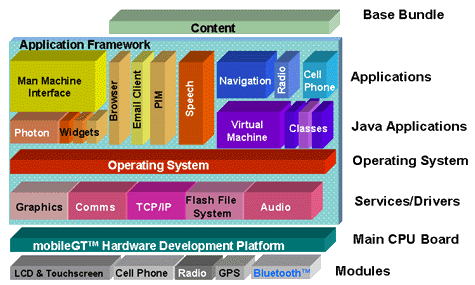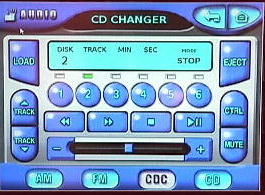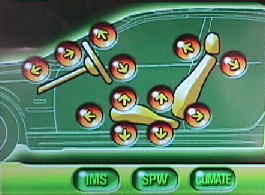January 13, 2003
COMPUTER CAR CRASHES
Do Automobile Telematics Boost Reliability? Or Will the Clock in the Car Soon Be Blinking Midnight?
by Eric Arnum, Editor
So when the computerized car of the future has a problem, will the driver have to pull off to the side of the road and reboot the engine? Two entire sections of the massive Consumer Electronics Show in Las Vegas were given over to the automobile last week. And while most of the gear and gadgets on display were designed primarily to play music as loud as possible inside the passenger compartment, some of the booths were showing driver information systems that connect the entertainment and the engine into one big computerized communications system -- automotive telematics.Jumping the Firewall
 Two of the companies that first put radio receivers into automobile dashboards some 70 or so years ago were among the vendors making the most noise in the North Hall of the Las Vegas Convention Center last week. Delphi Corp. had a booth right next to its partner XM Satellite Radio, where they could both display new
satellite-based musical entertainment systems alongside talking navigation systems and other computer-assisted systems for the car of the future. A few aisles away, Motorola Inc. had on display a driver information system built by partner Hyundai Autonet on top of its
mobileGT platform and microprocessors.
These automobile telematics systems do much more than play the radio. They also monitor the engine, and in some cases they can call into a repair shop to report mechanical problems. The color computer screens within Delphi's system also help drivers navigate, while Motorola's screens also help them adjust their seat and steering wheel. They both blend cellular telephone technology with car audio and even messaging technology, so can you play your voicemail in between cuts off your favorite Compact Disc.
Two of the companies that first put radio receivers into automobile dashboards some 70 or so years ago were among the vendors making the most noise in the North Hall of the Las Vegas Convention Center last week. Delphi Corp. had a booth right next to its partner XM Satellite Radio, where they could both display new
satellite-based musical entertainment systems alongside talking navigation systems and other computer-assisted systems for the car of the future. A few aisles away, Motorola Inc. had on display a driver information system built by partner Hyundai Autonet on top of its
mobileGT platform and microprocessors.
These automobile telematics systems do much more than play the radio. They also monitor the engine, and in some cases they can call into a repair shop to report mechanical problems. The color computer screens within Delphi's system also help drivers navigate, while Motorola's screens also help them adjust their seat and steering wheel. They both blend cellular telephone technology with car audio and even messaging technology, so can you play your voicemail in between cuts off your favorite Compact Disc.
Motorola's mobileGT Platform

 Ted Thacker, general director of sales and marketing at the Delphi Product and Service Solutions Division in Troy, MI, counts himself among the technophobes who still can't quite figure out how to transfer calls on their state-of-the-art office telephone systems, and whose kids have to program the VCR to tape his favorite shows.
Ted Thacker, general director of sales and marketing at the Delphi Product and Service Solutions Division in Troy, MI, counts himself among the technophobes who still can't quite figure out how to transfer calls on their state-of-the-art office telephone systems, and whose kids have to program the VCR to tape his favorite shows.
Digitally Challenged
"My kids think I am 'digitally challenged,' and they tell me that on a regular basis," he said. "But what Delphi is featuring here is the ability to give that more technically disadvantaged type of person like myself the opportunity to work in an environment with voice recognition that will do all those kinds of things, like forward a voicemail, or retrieve voicemail without having to punch a whole series of numbers on a very small cellphone face. So a lot of what Delphi is trying to do is adapt the technology into a user friendly environment that lets guys like me work in an environment where it's voice commanded, voice recognition kind of stuff, and then text-to-speech back to me so that I can keep my hands on the wheel, my eyes on the road, and my mind on the driving." John Hansen, director of marketing for Digital Audio Radio and Telematics in the Transportation and Standard Product Group of Motorola's Semiconductor Product Sector, said it's not really up to the driver to understand how all the engine diagnostics and telematics operates. "They're not going to care about those nuts and bolts type things, as long as they work and they're the right cost," he said. Unlike in the PC marketplace, driver's don't typically have to know what processor is at the heart of the system or what operating system is running upon it. Still, what drivers want to know is whether putting a computer in control of so many of their automobile's subsystems is asking for trouble. "The operating system that's at the heart of this thing is the same one that goes into nuclear power plants," Hansen added. "So we address that from a reliability and a safety standpoint right up front. We wanted to build a system that was very reliable; that you could upgrade and add features to it. In fact, with this capability you can even add features as it's up and running."
Thacker said that while it's getting harder and harder for drivers to repair their own cars, the good news is they don't need to be repaired as often. However, the bad news is that if the car of the future does break and these new telematics systems are part of the problem, it will take a highly skilled professional to fix them. The good news is that the car itself may be the one that detects the problem and arranges for the repair.
"With the advent of electronics, and the use of telematics, we've found not only a more reliable kind of a system, but a long-life system that makes that whole driving experience pretty much trouble-free," Thacker said. "But when you do have a problem, it's a much more technical problem. So these independent service technicians that buy Delphi products and Service Solutions products get from us not only the right technical product to replace or repair with, but also we give them the full training and diagnostic processes and otherwise through our Delphi Integrated Service Solutions Division, so that independent repair shop is ready for that technical repair job when it comes along."
"The operating system that's at the heart of this thing is the same one that goes into nuclear power plants," Hansen added. "So we address that from a reliability and a safety standpoint right up front. We wanted to build a system that was very reliable; that you could upgrade and add features to it. In fact, with this capability you can even add features as it's up and running."
Thacker said that while it's getting harder and harder for drivers to repair their own cars, the good news is they don't need to be repaired as often. However, the bad news is that if the car of the future does break and these new telematics systems are part of the problem, it will take a highly skilled professional to fix them. The good news is that the car itself may be the one that detects the problem and arranges for the repair.
"With the advent of electronics, and the use of telematics, we've found not only a more reliable kind of a system, but a long-life system that makes that whole driving experience pretty much trouble-free," Thacker said. "But when you do have a problem, it's a much more technical problem. So these independent service technicians that buy Delphi products and Service Solutions products get from us not only the right technical product to replace or repair with, but also we give them the full training and diagnostic processes and otherwise through our Delphi Integrated Service Solutions Division, so that independent repair shop is ready for that technical repair job when it comes along."
mobileGT, Phone Home
Hansen said that in some cases, the telematics-equipped automobile can phone in the trouble reports themselves. Motorola's microprocessors monitor the engine, and when something isn't working correctly an embedded Motorola mobile phone places a call to the factory or dealer to upload a diagnostic report. If something goes wrong in the system's software, the repair might even involve the download of a patch while the auto is still in motion, and perhaps without the knowledge or assistance of the driver. If it's a hardware bug, it might require a technician to repair or replace certain components. Either way, the repair shop might know the solution before the driver even knows there's a problem. "If you now have a feedback mechanism to that car, you now know what the issue is even before the car goes into the dealer, because you can look at the on-board diagnostics, or query the system," Hansen said. "By knowing what the situation is, you can schedule a warranty visit and already know which parts you're going to need." Total customer relation management, he said -- just knowing when things are going wrong out in the field -- "that kind of information is going to help a lot on the warranty. It's hard to say that's worth X dollars per car, but there's enough factors there that says it's worth something per car. We just need to figure out how much per car," he said. For example, in a pre-telematics automobile, the "check engine" light might pop on one day. What could be the problem? Is it a spark plug? Is there water in the oil? Something wasn't tightened properly?
"Your car knows a lot of this already from the on-board diagnostics," Hansen said. "If I can take those on-board diagnostics and send them back to the factory, they can then send down another program to the car, run that as additional diagnostics -- and this may be diagnostics that were developed after the car was sold."
For example, in a pre-telematics automobile, the "check engine" light might pop on one day. What could be the problem? Is it a spark plug? Is there water in the oil? Something wasn't tightened properly?
"Your car knows a lot of this already from the on-board diagnostics," Hansen said. "If I can take those on-board diagnostics and send them back to the factory, they can then send down another program to the car, run that as additional diagnostics -- and this may be diagnostics that were developed after the car was sold."
Automated Recalls?
In a recall situation, a notification message can be sent directly to the car, which then goes and informs the driver, telling them what needs to be fixed and at what priority the repair is needed. The problem might be serious, demanding their immediate attention. Or it might be a minor glitch that can be taken care of within the next month or so -- perhaps during the next scheduled maintenance. The two-way communication pathway into the car might even help diagnose whether problems affecting only some models from certain plants or one batch of components manufactured on a certain day are present in the system. Imagine that. The factory can place a call to your car, and ask it to check the lot numbers of some of its components. If the problem isn't present, your car will say so. Thacker said the auto mechanic of the future will be more like a computer repairman. "The ones that are going to do the digital kind of repairs will bring in very highly skilled diagnostic technician-type people to do that work," he said.Training Is Key
It's up to Delphi to help prepare those technicians to know what to do when a car calls in sick on its mobile phone. "What Delphi is doing to facilitate that through our Delphi Integrated Service Solutions Division is bringing to them this broadband information gathering kind of thing right at the point of repair," he said. "Our DS800 product features a whole array of training for these high technology repairs, and some proprietary diagnostic processes that helps the technician get there quicker. It takes a C-level technician and lets him do A-level technician work. So Delphi recognizes the need to keep these technicians up to date on the technologies. We're delivering through the independent facility the capability to do that with our DS800 platform and all the other stuff that comes along with it." On top of Motorola's mobileGT platform, Hyundai Autonet built a very modular driver information system, Hansen said, which replaces existing components such as the window and seat adjustments on a cost-neutral basis. Then it adds a CD player, a TV tuner, and such cutting edge technology as an interface for Bluetooth-compatible wireless phones. The system can even include an embedded mobile phone that monitors the engine and reports breakdowns or collisions to the repair facility.Hyundai Autonet's CD Screen

More or Less Complex?
As to whether this digital information system is more or less complex than existing pre-digital components, that depends on the user. Is a screen with a dozen arrows for steering wheel tilt and seat adjustments more or less complex than the existing system of levers, switches, and buttons? More importantly, when the car itself is telling the repairman what ails it, will the repairs be more exact or less so? That might very well depend on how well they did in their telematics training course.Hyundai Autonet's Seat Adjustment

| Go to Part Two |






